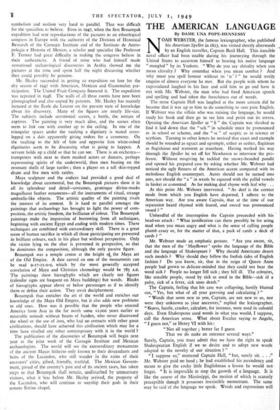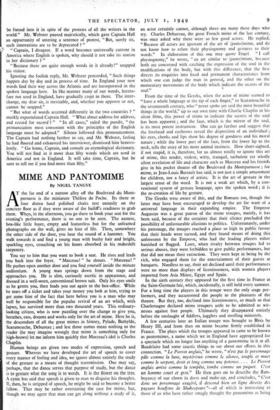THE AMERICAN LANGUAGE
By DAME UNA POPE-HENNESSY
NOAH WEBSTER, the famous lexicographer, who published his American Speller in 1823, was visited shortly afterwards by an English traveller, Captain Basil Hall. This irascible naval officer had been unable during his journeying through the United States to accustom himself to hearing his native language " mangled" by its Yankees. " Why do you say shivalry when you mean chivalry ? Why commbat when you mean combat ? And why must you spell honour without its ' u' ? " he would testily enquire of almost everyone he met. But the people with whom he expostulated laughed in his face and told him to go and have it out with Mr. Webster, the man who had fixed American speech and spelling and had taken the frenchiness out of words.
The more Captain Hall was laughed at the more certain did he become that it was up to him to do something to save pure English. If Webster was the villain who was ruining the language, he would study his book and then go to see him and point out its errors. Opening the American Speller at " S " the Captain was shocked to find it laid down that the " sch "-in schedule must be pronounced as in school or scheme, and the " sc " of sceptic as in science or scythian. Turning to other letters he noticed that exact and example should be sounded as egsact and egsample, either as cether, flagitious as flagishious and transient as transhent. Having worked his way through the Speller he set off for Newhaven to interview the pro- fessor. Without misgiving he tackled the snowy-bearded pundit and opened his prepared case by asking whether Mr. Webster had noticed the ugly flatness of the American accent compared with its melodious English counterpart. Aunts should not be turned into ants, nor should the " a " in wrath be equated with the pallid vowels in basket or command. As for making deaf rhyme with leaf why ...
At this point Mr. Webster intervened. " As deef is the correct mode from which you English have departed, I adhere to the American way. Are you aware Captain, that at the time of our separation heard rhymed with feared, and sword- was pronounced sward ? "
Unheedful of the interruption the Captain proceeded with his head-on attack: " What justification can there possibly be for using mad when you mean angry and what is the sense of calling people plumb crazy or, for the matter of that, a pack of cards a deck of cards ? "
Mr. Webster made an emphatic gesture. " Are you aware, sir, that the men of the ' Mayflower' spoke the language of the Bible and the language of Shakespeare ? Why should Americans desert such models ? Why should they follow the foolish tides of English fashion ? Do you know, sir, that in the reign of Queen Anne people had grown so delicate-minded that they could not bear the word sick ? People no longer fell sick ; they fell ill. The colonists, like sensible people, stood by sick as used in the Bible—sick of a palsy, sick of a fever, sick unto death."
The Captain, feeling that his case was collapsing, hastily blurted out, "Yes, but what of all your guessing and calculating ? "
" Words that seem new to you, Captain, are not new to us, nor were they unknown to four ancestors," replied the lexicographer. " Suess, hustle, cracker, calculate, for instance, were used in colonial days. Even Shakespeare used words in what you would, I suppose, call the American sense. What about Escalus saying to Angelo, " I guess not," or Henry VI with his: "Not all together ; better far I guess That we do make an entrance several ways."
Surely, Captain, you must admit that we have the right to speak Shakespearian English if we so desire and to adopt new words adapted to the novelty of our situation ? "
" I suppose so," muttered Captain Hall, " but, surely sir. . . ."
Mr. Webster paid no heed ; he had established his ascendency and meant to give the cocky little Englishman a lesson he would not- forget. " It is impossible to stop the growth of a language. It is like the course of the Mississippi, the motion of which is scarcely perceptible though it possesses irresistible momentum. The same may be said of the language we speak. Words and expressions will
be forced into it in spite of the protests of all the writers in the world." Mr. Webster paused majestically, which gave Captain Hall an opportunity of uttering a sentence of protest, "But, surely sir, such innovations are to be deprecated ? "
" Captain, I disagree. If a word becomes universally current in America where English is spoken, why should it not take its station in her dictionary ? "
"Because there are quite enough words in it already!" snapped his visitor.
Ignoring the foolish reply, Mr. Webster proceeded, " Such things happen day by day and in process of time. In England your new words find their way across the Atlantic and are incorporated in the spoken language here. In like manner many of our words, hereto- fore not used in England, have gradually crept in there. The inter- change, my dear sir, is inevitable, and, whether you approve or not, cannot be stopped."
" But what of words accented differently in the two countries ? " meekly expostulated Captain Hall. " What about address for address, and record for record?" "In all cases," ruled the pundit, " the pronunciation most consonant with the principles of the English language must be adopted." Silence followed this pronouncement. The Captain had nothing further to say, and Mr. Webster, feeling he had floored and exhausted his interviewer, dismissed him benevo- lently. " Go home, Captain, and consult an etymological dictionary. You will not find in it more than fifty words which are used in America and not in England. It will take time, Captain, but be sure to tell me if you find more than fifty."







































 Previous page
Previous page